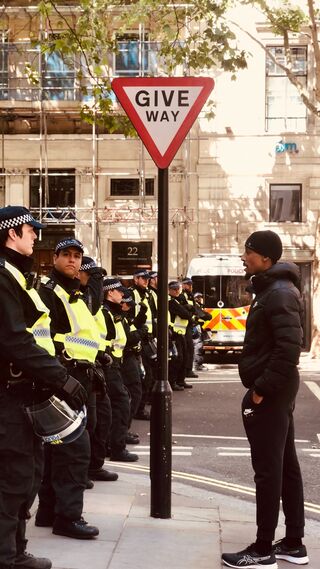Bias
Examining Police's Stop and Search Protocols
Cognitive biases at play in the UK?
Posted August 25, 2020 Reviewed by Kaja Perina

Many view stop and search as an important police tactic in the fight against crime in England and Wales. Increased numbers of stop and search have recently been linked to reduced stabbings and murders in London, while decreased levels have been blamed for a surge in violent crime in places such as Merseyside because ‘criminals knew that they were less likely to be stopped’. Police certainly view stop and search powers as fundamental to operational police work.
However, stop and search is seen by some as one of the more controversial powers vested in police. Not only because the overall impact of stop and search on crime levels is questionable, but because of wider issues associated with the use of this power. One persistent controversy concerns the disproportionate use of stop and search with black and minority ethnic groups (BAME), and the impact of this seemingly unfair and potentially racist practice in undermining public trust and police legitimacy, and possibly even fuellng crime.
The published figures are astonishing. Between April 2018 and March 2019, there were 375,588 stop and searches in England and Wales. Rates per 1000 were relatively low, at just 7. However, while there were only 4 stop and searches for every 1,000 White people there were 38 for every 1,000 Black and 100 for every 1000 Black ‘other’ person. This general trend mirrors previous years, but the most recent figures are even more astonishing. For example, in London alone the use of stop and search almost doubled during the COVID-19 lockdown with more than 20,000 black males being stopped and searched, which equates to over one quarter of all black 15 to 24-year olds in the capital.
The obvious questions that arise are why are so many BAME people stopped and searched and is this racist behaviour. Police can only search a person if they have ‘reasonable grounds’ to suspect he/she is carrying drugs, weapons, stolen property etc., or where ‘reasonable grounds’ are absent the stop and search must be sanctioned by a senior officer. It seems unlikely that BAME communities exhibit unique criminal behaviours that trigger reasonable grounds, and that there were more young black than white people out and about in the capital city during lockdown. So are police being prejudice and discriminatory on the basis of membership of a particular racial or ethnic group, be this intentional or otherwise.
These questions are tricky because frank conversations about racism are hard, and people have differing opinions according to experience and perceptions, and organisations and individuals are extremely defensive. What is known is that less than 6% of the police service in England and Wales are from BAME communities. Hence, cognitive biases, and in-group and out-group stereotypical perceptions very likely play a part in patterns of stop and search data.
Research on biases and stereotypes has consistently revealed how a ‘them and us’ mentality can easily bring about misunderstandings which trigger prejudiced decisions about out-group (here, non-police) members. A fundamental attribution error can occur where incorrect inferences are drawn about behaviours. Particularly behaviours that are not well understood. So cultural behaviour norms may well be being over attributed to criminal behaviour or intent, which are then perceived as objective indicators for reasonable suspicion.
Brunswick’s Lens Model argues that we do not experience and interpret our environment objectively but instead use available cues to make inferences and judgments about people despite the fact that observable cues are rarely diagnostic. Knowledge updating does not easily occur, and so this model predicts that police will continue to stop and search the same groups irrespective of outcomes, even in the face of possible alternative explanations or interpretations. Indeed, the latest stop and search figures reveal that police in Dorset are 25 times more likely to stop a black person, maybe because zero or reduced experience of BAME communities triggered biased judgments (Dorset is a predominantly white area).
I asked several former police colleagues why they think that BAME groups are disproportionately stopped and searched. Not a representative sample by any measure. Nonetheless, all independently offered similar responses, albeit using different terminology. All knew that I was writing this blog and that I was interested in their responses because I was a police officer in London from the late 1980s to early 2000s and so am rather out of touch. In short, their responses were that BAME people often behave more suspiciously and so trigger reasonable and objective grounds to suspect that they are ‘up to no good’, and that racism had absolutely nothing to do with it! An institutional attitude, perhaps?
This made me think that stop and search decisions maybe a classic example of Donald Rumsfeld’s ‘unknown unknown’ whereby police do not recognise what they do not know – that they are unaware of cognitive biases, and do not appreciate the impact of bias on professional behaviour.
That said, this situation feels rather more like a ‘known unknown' - police are undoubtedly aware, but being ‘not alarmed’ but ‘alert’ in the face of a significant amount of evidence indicating racist stop and search tactics suggests an intrenched position because of poor knowledge/understanding of biased decision-making. Or, perhaps stop and search is not always ‘about’ crime but wider processes of social control directed at deprived and marginal populations.
Tough but important questions for police, worldwide.




